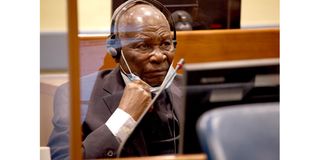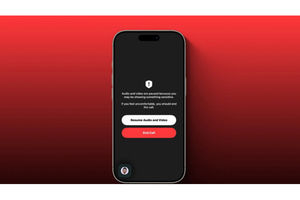What next if the Felicien Kabuga trial is thrown out?

Félicien Kabuga of Rwanda during his first appearance before the Mechanism for International Tribunals on 11 November 2020 in The Hague. PHOTO| UN IRMCT
What you need to know:
- The 89-year-old former businessman and one of the most-hunted fugitives is reported to be unfit to stand trial for his poor health
Arusha. Felicien Kabuga, the alleged mastermind and financier of the Rwanda genocide in 1994, may not stand trial after all.
The 89-year-old former businessman and one of the most-hunted fugitives is reported to be unfit to stand trial for his poor health.
He was arrested in a secret Paris suburb, France, in May 2020 after being in a hideout for 25 years with a $ 5 million bounty on his head.
When efforts to bring him to Arusha to stand trial for his role in the genocide failed on health grounds, he was taken to the Netherlands, where his trial began last year.
Now the International Residual Mechanism for Criminal Tribunals (IRMCT) or the Mechanism is doubtful on the trial currently underway in The Hague. According to the Rwandan media, medical experts have ruled out the continuation of the high-profile case of Mr. Kabuga’s deteriorating health.
“Felicien Kabuga is unfit to plead, analyse evidence, or participate meaningfully at a judicial proceeding,” said Gillian Mezey, a professor of forensic psychiatry.
She was one of the medics tasked with examining Kabuga’s health and coming up with an independent medical report regarding his fitness to stand trial.
The suspect’s state of health, reports went on, were to guide the court’s decision on whether to continue with the trial or not.
Prof Mezey was further quoted by the media as saying, “Kabuga’s ability to understand information and to express himself seemed very limited, stilted, and constricted.”
The medic played down the assertion that the suspect could still understand the court proceedings for him to be charged with crimes against humanity. “I am clear that he would be unable to do that given his current level of cognitive functioning,” Mezey said. Mr Kabuga is charged with seven counts, including genocide, complicity in genocide, direct and public incitement to commit genocide.
Other charges facing the former associate of the former Rwandan regime at the time of the genocide are attempts to commit genocide and conspiracy to commit genocide.
Reports that his trial may be called off are likely to be met with outrage from survivors of the genocide against the Tutsi, which claimed nearly one million lives. “The possibility of suspending Kabuga’s trial could be another setback in the delivery of justice,” said Egide Gatari, a leader of a group of survivors.
He added that this would be one of the incidents of denial of justice to victims and survivors, noting that even Mr Kabuga’s delayed arrest and trial has been “an injustice done to us by the foreign countries.”
The health challenges facing Mr. Kabuga are not only threatening to put a halt to his trial in The Hague.
It was for the same reasons that he could not be brought to stand trial at the Mechanism facilities in Arusha after his arrest in 2020.
Mechanism officials conceded recently that had the former Rwandan businessman been brought to Arusha for trial, he would be the last fugitive to be hosted at the UN detention facility here.
The facility, located at Kisongo near the Arusha airport, was closed last month and handed over to the Tanzanian government. It was opened in 1996.
“There are no more fugitives. Mr Kabuga was to be the last case, but he would not be tried in Tanzania,” said Mr Abubaccar Tambadou, the Registrar of the UN Tribunal.




